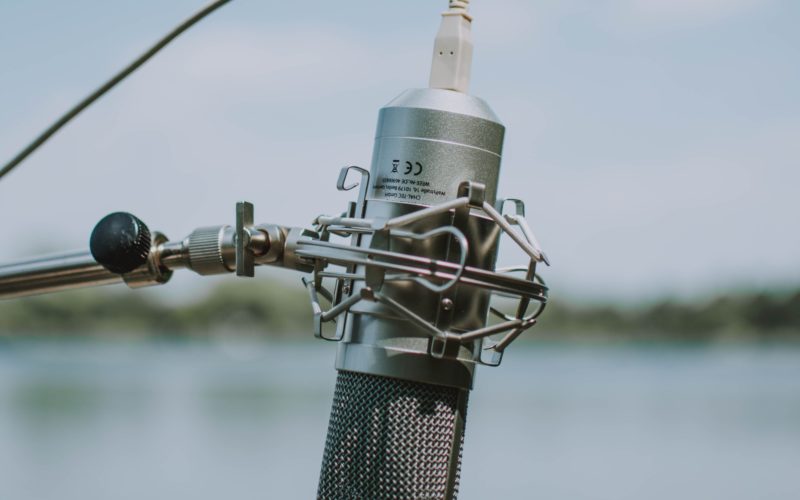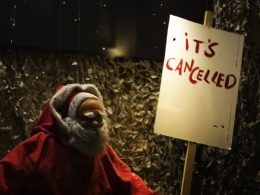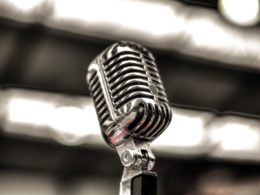The details described in most true crime podcasts may seem far too gory to be a work of nonfiction, but they are supposed to be exactly what the name of the genre suggests — true.
Over the past decade, the true crime genre has exploded in popularity. The true crime podcasts Criminal and Serial were both released in 2014 and immediately took over the podcasting space.1[1]Criminal, Vox Media Podcast Network (Jan. 30, 2014) (downloaded using Spotify); Serial, Serial Productions (Oct. 3, 2014) (downloaded using Spotify). Criminal’s premiere was met with accolades, and it was quickly deemed one of the “best podcasts of all time.”2[2]Press, Criminal, https://thisiscriminal.com/about#press (last visited Feb. 23, 2022) The first season of Serial alone had over 300 million downloads, setting a podcasting record.3[3]Our Other Shows, This American Life, https://www.thisamericanlife.org/about/our-other-shows (last visited Feb. 21, 2022). Following Criminal and Serial’s impressive debuts, the true crime genre steadily rose in the charts, becoming the third most popular podcast genre among “heavy” podcast listeners in the United States.4[4]Nielson, Podcasting Today (2021), https://www.nielsen.com/wp-content/uploads/sites/3/2021/02/Nielsen-Podcasting-Today-Feb-2021.pdf.
With such a massive listener base, it can be easy to forget that true crime podcasting is still relatively new. A result of its newness, the legalities involved with true crime podcasts are still somewhat blurry. At times, true crime podcasters (especially ones without a legal background) skirt the line in certain areas of law, such as defamation and privacy. The content for true crime podcasts comes from actual crimes involving actual people who experienced actual events and traumas — so what happens when a “true” crime podcast airs false information about their subjects? What rights do these subjects have?
The answers to these questions touch upon a number of laws, including defamation, freedom of speech, and fair report and fair comment privileges. The scope of these laws varies from state to state. In New York, defamation has been recognized as “the making of a false statement which tends to expose the plaintiff to public contempt, ridicule, aversion or disgrace, or induce an evil opinion of him in the minds of right-thinking persons, and to deprive him of their friendly intercourse in society.”5[5]Dillon v. City of New York, 704 N.Y.S.2d 1, 5 (App. Div. 1st Dep’t 1999). A defamation claim could arise if a podcaster makes a false statement of fact on-air about another person that injures their reputation — a fairly easy mistake to make when talking about real people and real crimes.
When basing an entire podcast episode around a person and their alleged actions, that person’s level of notoriety is significant. If the subject is a private individual, a podcaster can be held liable for defamation if they negligently make a false statement on-air about that person. Whether the podcaster made the statement “with malice” does not matter: If the private person can prove the statement was (i) of defamatory nature, (ii) refers to them, and (iii) was negligently published or shared on-air by the podcaster, the podcaster may be liable for defamation.6[6]Zaidi v. United Bank Ltd., 747 N.Y.S.2d 268, 272 (Sup. Ct. 2002).
However, depending on the crime’s level of public interest, a main player in a true crime may not be considered a “private person” in terms of proving defamation; instead, that person may be a “limited-purpose public figure.”7[7]Medure v. New York Times Co., 60 F. Supp. 2d 477, 485 (W.D. Pa. 1999). A limited-purpose public figure is someone who has voluntarily drawn attention to himself or herself or uses his or her position in the controversy “as a fulcrum to create public discussion.”8[8]Wolston v. Reader’s Digest Association, 443 U.S. 157, 168 (1979). To determine whether a person qualifies as a public figure or a limited-purpose public figure, a court will consider whether the person has thrusted themselves into the middle of a public controversy or have invited attention and comment.9[9]James v. Gannett, Co., Inc., 40 N.Y.2d 415, 422 (N.Y. 1976). In New York Times v. Sullivan, the court held that public figures must prove, by clear and convincing evidence, that a defamatory statement was made with actual malice.10[10]New York Times Co. v. Sullivan, 376 U.S. 254, 280 (1964). That means private persons involved in a matter of public interest, such as a high-profile crime, will likely have this same standard of proof.11[11]False Accusations—Defamation of Character by Libel or Slander, New York City Bar Association, https://www.nycbar.org/get-legal-help/article/personal-injury-and-accidents/false-accusations/ (last visited Feb. 21, 2022).
The threshold for a public figure or a limit-purpose public figure to prove defamation is much higher than that of a private person, so unless a podcaster made a false statement with actual malice, it will be difficult for the subject of a true crime podcast to prove defamation. There are also several privileges and defenses podcasters can use to protect themselves from being held liable for defamation. The truth provides a complete defense to a defamation claim.12[12]Panghat v. New York Downtown Hosp., 925 N.Y.S.2d 445, 446 (App. Div. 1st Dep’t 2011). Additionally, there are qualified privileges that shield certain communications that involve “public interest” from defamation.13[13]Liberman v. Gelstein, 605 N.E.2d 344, 349 (N.Y. 1992)
These qualified privileges are exemplified in Parker v. Spotify USA, Inc.: Last year, Spotify was hit with a lawsuit when Son of a Hitman podcasters misrepresented the purpose of their true crime podcast to a witness, who had agreed to an interview with the hosts that would later be aired.14[14]Parker v. Spotify USA, Inc., No. 5:21-CV-175-DAE, 2021 WL 6750851, at *1 (W.D. Tex. 2021). According to the lawsuit filed in the Western District of Texas, the podcasters used only five minutes of the full 90-minute interview to sensationalize the witness’s involvement in the conviction of Charles Harrelson, who was found guilty of murdering a federal judge in the 1980s.15[15]Id. at *2. The lawsuit claims the podcast purposely led the audience to the false conclusion that the witness was complicit in a scheme to unfairly convict Harrelson.16[16]Id. The witness said she was a “private individual who is not in the public eye for any purpose and that the defamatory statement concerned a matter of private concern” and “falseness” was aired at the expense of her reputation, thus prompting her to sue Spotify USA, as well as High Five Content, and Tradecraft Alternative, for defamation and fraudulent inducement.17[17]Id. at *3. The defendants argued that all statements aired were either substantially true, not capable of defamatory meaning, or nonactionable opinions.18[18]Id. at *5. The defendants also argued that the true crime podcast was protected by both the fair report and fair comment privilege.19[19]Id. at *6. The court agreed with the defendants regarding these privileges and dismissed the case.20[20]Id. at *10.
Prior to the Spotify case, there was Elias v. Rolling Stone LLC, in which three former fraternity brothers sued journalist Sabrina Rubin Erdely for statements she made on the podcast DoubleX Gabfest.21[21]Elias v. Rolling Stone LLC, 872 F.3d 97, 101 (2d Cir. 2017). The plaintiffs claimed Erdely had defamed them by identifying them individually on the podcast as participants in a “true crime” that turned out to be untrue.22[22]Id. When it came to light that Erdely’s primary source had fabricated the crime, the plaintiffs promptly sued Erdely, along with Rolling Stone and Wenner Media, for defamation.23[23]Id. The plaintiffs, however, did not meet the necessary standard of proof for defamation, as the court found that the statements made on the podcast were actually non-actionable opinions — not factual assertions.24[24]Id. The District Court found in favor of the defendants regarding the defamation claim arising from the podcast, and the Second Circuit of Appeals affirmed.25[25]Id.
In both cases, the plaintiffs were unable to meet the standards of proof required for defamation, and the courts granted the defendants’ motions to dismiss. Although the podcasters in these situations were ultimately not liable for defamation, these recent examples still serve as cautionary tales about why true crime podcasters should always be mindful of the whole truth when it comes to the facts about the crimes — and, perhaps more specifically, the people — they cover.
Because true crime podcasts serve as entertainment, it may be tempting for a podcaster to “spice up” their subjects’ stories for the sake of interest; however, podcasters should rise above this temptation and do their due diligence to ensure they are not venturing into defamation territory.
Written by: Maria Fischer
Maria is a 2024 J.D. Candidate at Brooklyn Law School
1 Criminal, Vox Media Podcast Network (Jan. 30, 2014) (downloaded using Spotify); Serial, Serial Productions (Oct. 3, 2014) (downloaded using Spotify).
2 Press, Criminal, https://thisiscriminal.com/about#press (last visited Feb. 23, 2022)
3 Our Other Shows, This American Life, https://www.thisamericanlife.org/about/our-other-shows (last visited Feb. 21, 2022).
4 Nielson, Podcasting Today (2021), https://www.nielsen.com/wp-content/uploads/sites/3/2021/02/Nielsen-Podcasting-Today-Feb-2021.pdf.
5 Dillon v. City of New York, 704 N.Y.S.2d 1, 5(App. Div. 1st Dep’t 1999).
6 Zaidi v. United Bank Ltd., 747 N.Y.S.2d 268, 272 (Sup. Ct. 2002).
7 Medure v. New York Times Co., 60 F. Supp. 2d 477, 485 (W.D. Pa. 1999).
8 Wolston v. Reader’s Digest Association, 443 U.S. 157, 168 (1979).
9 James v. Gannett, Co., Inc., 40 N.Y.2d 415, 422 (N.Y. 1976).
10 New York Times Co. v. Sullivan, 376 U.S. 254, 280 (1964).
11 False Accusations—Defamation of Character by Libel or Slander, New York City Bar Association, https://www.nycbar.org/get-legal-help/article/personal-injury-and-accidents/false-accusations/ (last visited Feb. 21, 2022).
12 Panghat v. New York Downtown Hosp., 925 N.Y.S.2d 445, 446 (App. Div. 1st Dep’t 2011).
13 Liberman v. Gelstein, 605 N.E.2d 344, 349 (N.Y. 1992).
14 Parker v. Spotify USA, Inc., No. 5:21-CV-175-DAE, 2021 WL 6750851, at *1 (W.D. Tex. 2021).
15 Id. at *2.
16 Id.
17 Id at *3.
18 Id at *5.
19 Id at *6.
20 Id. at *10.
21 Elias v. Rolling Stone LLC, 872 F.3d 97, 101 (2d Cir. 2017).
22 Id.
23 Id.
24 Id.
25 Id.




